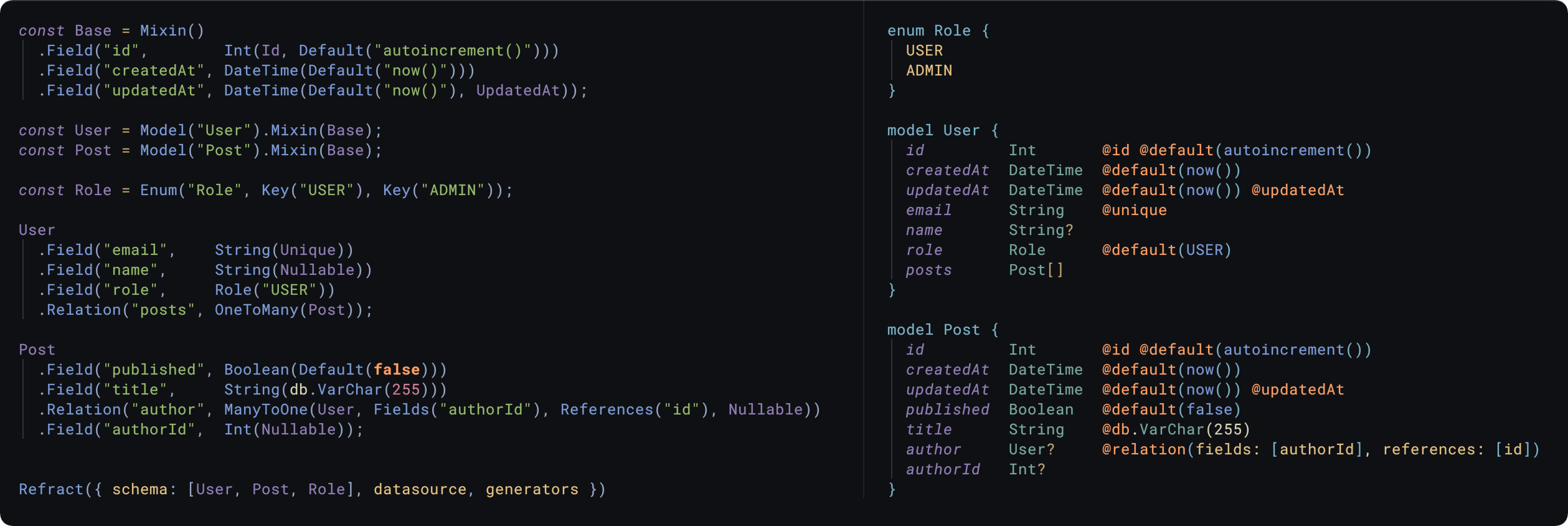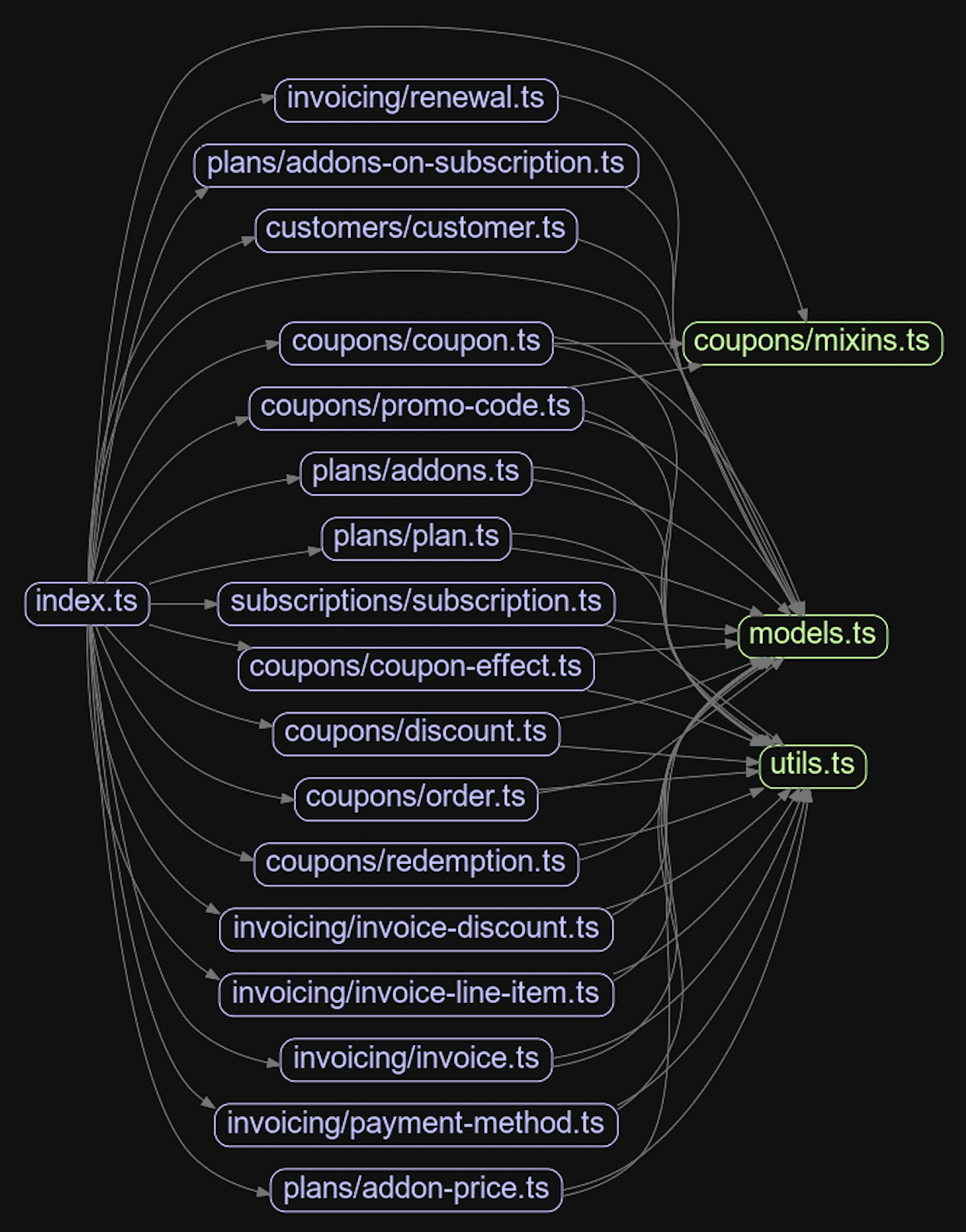Generate Prisma from TypeScript
npm i -D @cwqt/refract
yarn add -D @cwqt/refractSee here for a full demo.
Use the Refract default export of this package to generate a Prisma file.
// schema.ts
// Import the entry-point
import Refract from '@cwqt/refract';
// Import your custom Models
import { Roles, User, Posts } from './models';
Refract({
// Supply models/enums for generation
schema: [Roles, User, Posts],
// https://www.prisma.io/docs/reference/api-reference/prisma-schema-reference#datasource
datasource: {
provider: 'postgresql',
url: 'env("DATABASE_URL")',
shadowDatabaseUrl: 'env("DATABASE_SHADOW_URL")',
referentialIntegrity: 'prisma',
},
// https://www.prisma.io/docs/reference/api-reference/prisma-schema-reference#generator
generators: [
{
provider: 'prisma-client-js',
previewFeatures: ['referentialIntegrity'],
engineType: 'library',
binaryTargets: ['native'],
},
],
// Define output path for generated Prisma file
output: path.join(process.cwd(), 'schema.prisma'),
});A command like npx ts-node schema.ts will run this TypeScript code & generate
the resulting Prisma file at the output path.
const User = Model('User', 'This is an optional comment');
User.Field('id', Int(Id, Default('autoincrement()')), 'The primary key');
// // This is an optional comment
// model User {
// // The primary key
// id Int @id @default(autoincrement())
// }Model uses a fluid interface, so you can chain the following methods:
.Field(name, scalar): Add a scalar column to a Model.Relation(name, relation): Add a relationship to a Model.Block(compound): Add a block field, e.g.@@id,@@unique,@@map.Mixin(mixin): Inherit columns from a Mixin for compositional Models.Raw(value): Escape hatch into writing raw Prisma
Scalars are the types of data that the column contains, Int, String
etc. You can define & re-use Scalars wherever in your models
const PrimaryKey = Int(Id, Default('autoincrement()'));
// id Int @id @default("autoincrement()")
m.Field('id', PrimaryKey);Modifiers are functions/objects that append attributes to a column e.g.
// String? @default("Hello World")
String(Default('Hello World'), Nullable);
// Int @id @unique @default(autoincrement())
Int(Id, Unique, Default('autoincrement()'));
// DateTime @default(now()) @updatedAt
DateTime(Default('now()'), UpdatedAt);Certain modifiers are constrained to certain scalars, the mapping is:
String: Unique, Id, Default(string | 'auto()'), Limit(number)Int: Unique, Id, Default('cuid' | 'autoincrement()' | 'uuid()' | number)Float: Unique, Default(number)BigInt: Unique, Default(BigInt)Bytes: UniqueDecimal: UniqueBoolean: UniqueDateTime: Default('now()'), UpdatedAtUnsupported
Additionally all scalars can use: Nullable, Map, Ignore, Raw & Array modifiers.
The Raw() modifier can be used as an escape hatch:
// String @db.ObjectId
String(Raw('@db.ObjectId'));Currently there's support for mysql, postgresql, cockroachdb & mongodb @db
attributes, and can be used like all the other modifiers.
import { MySql as db } from '@cwqt/refract';
// email String @db.VarChar(255)
m.Field('email', String(db.VarChar(255)));Check src/public/db/mysql.ts (mongo.ts/postgresql.ts/cockroach.ts) for list of mappings between scalar types &
attributes.
OneToMany(model, name?, ...modifiers)- Nullable
OneToOne(model, name?, fields, references, ...modifiers)OneToOne(model, name?, ...modifiers)- Nullable, OnUpdate(Action), OnDelete(Action)
ManyToOne(model, name?, fields, references, ...modifiers)- Nullable, OnUpdate(Action), OnDelete(Action)
Where Action is one of: Cascade, Restrict, NoAction, SetNull, SetDefault
const User = Model('User');
const Something = Model('Something');
Something
.Field('id', PrimaryKey)
// Holds foreign key
.Field('userId', Int())
.Relation('user', OneToOne(User, Fields('userId'), References('id')));
// Alternatively you can do Fields('userId', Int()) to avoid the extra
// .Field() call, this'll add the column to the model for you
User
.Field('id', PrimaryKey)
.Relation('thingy', OneToOne(Something));const Post = Model('Post');
const Category = Model('Category');
Post
.Field('id', Int(Id, Default('autoincrement()')))
.Relation('categories', OneToMany(Category));
Category
.Field('id', Int(Id, Default('autoincrement()')))
.Relation('posts', OneToMany(Post));The 2nd parameter of the Relation can be a string & explicitly denote the name of the relation.
// pinnedBy User? @relation(name: "PinnedPost", fields: [pinnedById], references: [id])
m.Relation(
'pinnedBy',
OneToOne(
User,
'PinnedPost',
Fields('pinnedById'),
References('id'),
Nullable,
),
);OnUpdate & OnDelete modifiers can be used as follows:
// tag Tag? @relation(fields: [tagId], references: [id], onUpdate: Cascade, onDelete: Cascade)
m.Relation(
'tag',
ManyToOne(
Fields('tagId'),
References('id'),
OnUpdate('Cascade'),
OnDelete('Cascade'),
Nullable,
),
);Composed of two parts:
Enum(name, comment?, ...Key)Key(value, ...modifiers, comment?)- Map
const Animal = Enum(
'Animal',
Key('Seacow'),
Key('Capybara'),
Key('Otter', Map('otter')),
);
// fave Animal @default(Seacow)
// null Animal?
model
.Field('fave', Animal('Seacow'))
.Field('null', Animal());
const WithComment = Enum(
"Foo", "This is with a comment",
Key("Bar", "Another comment")
);
// // This is with a comment
// enum Foo {
// // Another comment
// Bar
// }Used for adding fields like @@map, @@id, @@fulltext etc.
import { Compound, Mongo as db } from '@cwqt/refract';
// Creating a compound index
model
.Field('id', Int(Id, Default('autoincrement()')))
.Field('authorId', Int())
.Relation('author', ManyToOne(User, Fields('authorId'), References('id')))
.Block(Compound.Id('id', 'authorId'));
// e.g. in MongoDB schemas
Model('User')
.Field('id', String(Id, db.ObjectId, Map('_id')))
.Block(Compound.Map('users'));Allows you to re-use groups of fields, compositional models.
const Timestamps = Mixin()
.Field('createdAt', DateTime(Default('now()')))
.Field('updatedAt', DateTime(Nullable, UpdatedAt));
const User = Model('User').Field('id', PrimaryKey).Mixin(Timestamps);
// User will now have `createdAt` & `updatedAt` columnsconst prisma = Refract.generate({
datasource: {...},
generators: [...],
schema
})
console.log(prisma); // schema.prisma contentsAt some point you'll want to split the schema across files, which introduces issues with circular relationships when you're importing for .Relation()s in Node
One way to get around this is to have a file with all the models/enums defined, and have files import those & apply the fields, e.g.
// models.ts ------------------------------
const User = Model("User");
const Post = Model("Posts");
// ... and all the other Models
// users.ts ------------------------------
import { User, Post } from './models'
User
.Field("id", Int(Id, Default("autoincrement()")))
.Relation("posts", OneToMany(Post))
// posts.ts ------------------------------
import { User, Post } from './models'
Post
.Field("id", Int(Id, Default("autoincrement()")))
.Field("authorId", Int())
.Relation("author", ManyToOne(User, Fields("authorId"), References("id")))
// refract.ts ------------------------------
import * as schema from './models'
// IMPORTANT: import the model files which performs the `.Field()`, `.Relation()`
// etc. calls, thereby adding the columns to the models
import "./posts";
import "./users";
Refract({
datasource: {...},
generators: [...],
schema
})
